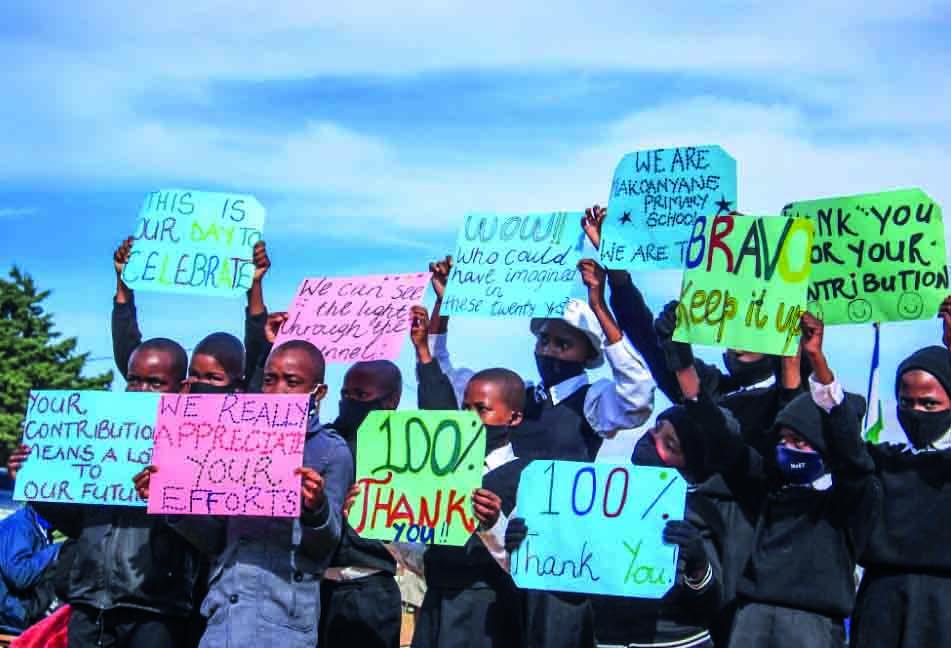Africa-Press – Lesotho. WHEN Mabatho Litlatse* is on her menstrual periods, the last thing she wants to do is go to school. Her schoolmates once put her through so much shame after she stained her uniform that she wished the earth would swallow her up.
“My classmates laughed at me. I felt like quitting school,” said the 12-year-old. Menstruation, she said, disrupts her learning as she always fears leaving her uniform stained.
“The absence of toilets here makes me uncomfortable to change my pad in the forest as I don’t know who else is watching considering that our school is surrounded by homes,” she said.
“Rather, I skip school when I am on my periods. Luckily it takes only three days and sometimes two. ”
She told thepost that she was excited about plans to complete the construction of toilets at the school. “I will have my privacy to change my pads anytime,” she said.
The construction of the toilets at Seboka Primary School in Maseru rural is part of the Five Hub Schools Project. The project is a result of collaboration amongst the Ministry of Education, Action Ireland Trust (AIT) and Rise International.
Seboka Primary principal, ’Mapakalitha Mafaesa, said they will continue engaging parents to establish child-friendly schools in collaboration with communities and other role players.
Mafaesa said the toilets at the school are “unusable”. “We were disappointed, especially for girls when they were on their periods. They used the bush as toilets. This project came at the right time as we were in dire need of toilets,” Mafaesa said.
AIT, the Ministry of Education and Rise International are helping build toilets with running water, school kitchens, rain water harvesting facilities and food gardens for five schools in the Lithabaneng area.
The schools which are set to benefit from the project are Seboka Primary, Makoanyane Primary, Leqele Primary, Lithabaneng Primary and Lithabaneng High School.
According to AIT CEO, Fran Whelan, the project involves facilitating “Child Friendly Schools” based on the simple premise that schools can and should operate in the best interests of the child.
As well as much needed infrastructure improvements, Whelan said the project includes teacher training and equipping students with additional life and entrepreneurial skills. With over 5 500 students enrolled in the five schools, Whelan said there is great need for sanitation.
In an attempt to curb the spread of Covid-19, pupils and staff will utilise mobile hand wash stations that have been recently installed until the completion of the construction of the toilets.
“Community participation is key in the progression of this project, hence the surrounding communities of Lithabaneng, Ha-Matala and Ha-Leqele were consulted in the design phase and will also be engaged in the implementation and recruited in the construction of these projects,” Whelan said.
“We are so pleased that we have progressed in our involvement in the education sector in Lesotho where we have had a presence since 2011 running school building projects, mentoring of teachers and classroom assistance,” he said.
He added that “this project is community-based and is set to inspire the communities through their schools and also nurture hope and enterprise for the future.
” The schools are not the only ones benefitting.
Through a partnership with Rise International, graduates and unemployed construction professionals like architects, planners and engineers are part of the design teams.
Rise International founder, Daniela Gusman, said the prioritised schools had problems with hygiene. “We realised that there were many schools in need but the five were identified by the ministry and it makes it great that they are close to each other,” Gusman said.
She said the five-year project is worth about M30 million, inclusive of teachers’ training programmes and computer labs amongst other items. “We are very proud to be the implementing partner of this project because it aligns perfectly with our core values which are community-driven development and social enterprise,” she said.
She added: “Through participatory design workshops, we facilitated and encouraged the engagement of the community in the planning and designing of the project, promoting school-community partnerships.
” Gusman said the food gardens will be a valuable resource for the schools to grow their own vegetables for feeding schemes and for income generation. She said the community also has the opportunity to work on the construction sites, ensuring that they benefit from the project.
“The construction process is being done by our local graduates called pioneers – giving young Basotho the opportunity to practice all they learnt during our fellowship programme.
” Education Minister Ntlhoi Motsamai said the occasion marked “yet another gesture of generosity to schools in Lesotho by AIT”. She said the project aims at ensuring that schools are safe and have adequate sanitation for all children.
“It tackles issues that include hygiene, ICT and non-corporal punishment in schools and teachers and young leaders, (monitor, monitresses and prefects were trained for child friendly initiative on leadership issues,” Motsamai said.
Motsamai said they were faced with the challenge of meeting Sustainable Development Goals (SDGs), particularly SDG4, which ensures inclusive education and equitable quality and promote lifelong learning for all.
“We are working together to achieve this goal and the investment by AIT in education is significant and crucial towards its achievement and for this we are grateful,” she said.
The Lithabaneng councillor, Lebohang Karale, said he was happy about the initiative. “This will indeed help improve our children in the long run especially with entrepreneurial skills and I am thankful.
We were in need,” Karale said. Speaking on behalf of Lithabaneng MP, Liteboho Pholoane, thanked all stakeholders highlighting that it was fulfilling to witness the initiative which is meant to improve lives.
“We understand that through these developments, they will feel empowered to learn following months of school closures due to the Covid-19 pandemic,” Pholoane said.
For More News And Analysis About Lesotho Follow Africa-Press






